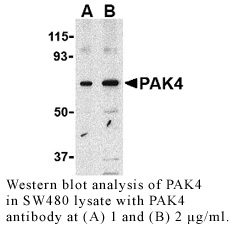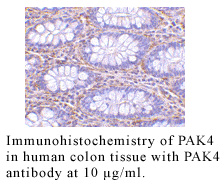Anti-Human P21-Activated Kinase 4 (PAK4)
Data
- -
- -
Antibody DetailsProduct DetailsReactive Species Human Host Species Rabbit Product Concentration 0.5 mg/ml Formulation This polyclonal antibody is formulated in phosphate buffered saline (PBS) pH 7.4 containing 0.02% sodium azide as a preservative. Storage and Handling This polyclonal antibody is stable for at least one week when stored at 2-8°C. For long term storage, aliquot in working volumes without diluting and store at –20°C in a manual defrost freezer. Avoid Repeated Freeze Thaw Cycles. Country of Origin USA Shipping Next Day Ambient RRIDAB_2831539 Each investigator should determine their own optimal working dilution for specific applications. See directions on lot specific datasheets, as information may periodically change. DescriptionDescriptionSpecificity Rabbit Anti-Human P21-Activated Kinase 4 (PAK4) recognizes Human PAK4. This polyclonal antibody was purified using affinity chromatography. Background The p21-activated kinases (PAKs) are serine-threonine kinases that bind to the active forms of Cdc42 and Rac. They are divided into two groups, the first of which include PAK1, 2 and 3, and can be activated by Cdc42/Rac binding. Group 1 PAKs contain an autoinhibitory domain whose activity is regulated by Cdc42/Rac binding. The group 1 PAKs are known to be involved in cellular processes such as gene transcription, apoptosis, and cell morphology and motility. Much less is known about the second group, which includes PAK4, 5 and 6. These proteins are not activated by Cdc42/Rac binding. PAK4 was initially identified as a novel effector of Cdc42Hs. Co-expression of PAK4 and Cdc42Hs resulted in induction of filopodia and actin polymerization, showing that it is involved in cytoskeletal reorganization. Other experiments have shown PAK4 to be essential for embryonic viability and proper neuronal development. PAK4 has also been implicated in anchorage-independent growth of tumor cells and is required for activation of several cancer prosurvival pathways. PubMed References & Citations1. Jaffer, ZM. et al. (2002) Int. J. Biochem. Cell Biol. 34:713 2. Yang, F. et al. (2001) J. Biol. Chem. 276:15345 3. Kaur, R. et al. (2005) J. Biol. Chem. 280:3323 Technical ProtocolsCertificate of Analysis |
Related Products
- -
- -
Prod No. | Description |
|---|---|
P193 | |
P200 |




